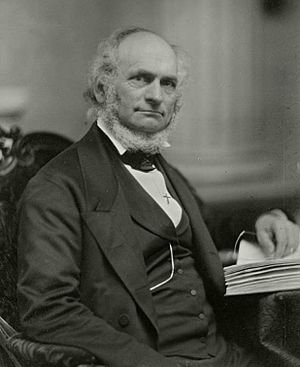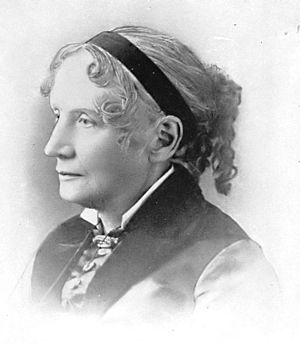Calvin Ellis Stowe facts for kids
Quick facts for kids
Calvin Ellis Stowe
|
|
|---|---|

circa 1850
|
|
| Born |
Calvin Ellis Stow
April 6, 1802 |
| Died | August 22, 1886 (aged 84) |
| Nationality | American |
| Occupation | Biblical scholar, clergyman, literary agent, public education advocate |
| Spouse(s) | Eliza Tyler (1832–1834) Harriet Beecher Stowe (1836–1886, his death) |
| Relatives | Bennet Tyler (1st father-in-law) Dr. Lyman Beecher (2nd father-in-law) |
Calvin Ellis Stowe (born April 6, 1802 – died August 22, 1886) was an important American scholar. He helped make public education better in the United States. During his life, he taught languages and religious studies at several colleges. These included Andover Theological Seminary, Dartmouth University, Lane Theological Seminary, and Bowdoin College. He was also the husband and helper of Harriet Beecher Stowe. She wrote the very famous book Uncle Tom's Cabin.
Contents
Early Life and Education
Calvin Stowe was born in South Natick, Massachusetts. When he was six years old, his father died in an accident. This left his mother and two sons with very little money. Calvin went to live with his grandparents.
A Love for Books
At age twelve, Calvin became an apprentice to a paper maker. Even though he worked hard, he loved books very much. He learned the basics of Latin by studying whenever he had a free moment. He saved enough money to attend Bradford Academy for a year in 1818.
His strong desire to learn caught the eye of people who helped him. They sent him to an academy in Gorham, Maine around 1819 or 1820.
College Years
Calvin then went to Bowdoin College. In 1821, he joined the Peucinian literary society. This group had a collection of 600 to 700 books. He became the society's secretary in 1822. After many books were donated, Stowe became a paid librarian for the college in 1824.
He graduated with honors in 1824. Franklin Pierce, who later became president of the United States, was a classmate. Pierce said he learned a lot by sitting next to Stowe during tests. Famous writers like Henry Wadsworth Longfellow and Nathaniel Hawthorne were in the class just below Stowe's.
After graduating from Bowdoin, he stayed there for a year. He worked as an instructor and librarian. In 1825, he started studying at Andover Theological Seminary. He earned his Master's Degree from Bowdoin in 1827. He also translated a scholarly book called Hebrew Commonwealth. He finished his studies in 1828. Calvin Stowe was very good at many languages, including Greek, Latin, Hebrew, and Arabic.
Career as an Educator
Editor and Translator
In 1829, Calvin Stowe became the editor of the Boston Recorder. This was the oldest religious newspaper in the United States. He also published a translation of a book about sacred poetry.
Professor and Librarian
In 1830, he became a professor of Greek at Dartmouth College. Students liked him a lot. Dartmouth gave him an honorary Master's Degree for his continued learning. Two years later, he became a professor of Biblical Literature at Lane Theological Seminary in Cincinnati.
He was also the librarian there. He helped build the library's collection to 10,000 books by 1837. Some of these books were bought during a trip to Europe in 1836. By 1840, the Lane library was the largest academic library west of the Appalachian Mountains.
Later, he taught religion at Bowdoin from 1850 to 1852. He also taught at Andover Theological Seminary from 1852 to 1864.
Advocate for Public Education
While in Cincinnati, Stowe became a strong supporter of public schools. He believed that students needed good elementary education. This was especially true for schools in the western United States at that time. He worked very hard on this goal.
In 1836, he traveled to England to buy books for Lane Seminary. But he also had an important job from the Ohio General Assembly. He was asked to visit public schools in Europe, especially in Prussia. When he returned, he wrote a report called Report on Elementary Education in Europe. In this report, he encouraged Ohio to create a state-supported school system, like the German states had. The Ohio Legislature ordered a copy of his book for every school district in the state.
He also helped start the College of Teachers in Cincinnati in 1833.
Author
Calvin Stowe wrote for religious magazines throughout his career. After his wife Harriet's novel became famous, Stowe wrote his own best-selling book. It was called Origin and History of the Books of the Bible, both Canonical and Apocryphal (1867). He also published other books on interpreting the Bible and education.
Personal Life
In 1832, Calvin Stowe married Eliza Tyler. Her father was Rev. Bennet Tyler, who was president of Dartmouth. They moved to Walnut Hills, Cincinnati, Ohio. Sadly, Eliza died in 1834. Eliza was a good friend of Harriet Beecher Stowe.
In January 1836, Calvin married Harriet. Her father was Dr. Lyman Beecher, who was president of Lane Theological Seminary. They lived in Cincinnati after they married. In 1850, they moved to Brunswick, Maine. This was a time of trouble because of the Fugitive Slave Act of 1850. The family moved to Amherst, Massachusetts in 1852, which was the last move for Stowe's career.
In 1864, because he was not well, he left his teaching job. He moved to Hartford, Connecticut. He became a member of the American Antiquarian Society in 1865. Harriet wrote her famous novel, Uncle Tom's Cabin in 1852. In 1853 and 1856, he visited Europe with Harriet. His childhood stories helped Harriet write her books Oldtown Folks (1869) and Sam Lawson's Old Fireside Stories (1872).
They also had a winter home in Florida along the St. Johns River. It was on a large property with an orange grove. After being ill for several months, Calvin Stowe died on August 22, 1886, in Hartford, Connecticut.
Helping Freedom Seekers
While living in Cincinnati, the Stowes helped freedom seekers on the Underground Railroad. This was a secret network that helped enslaved people escape to freedom in the North and Canada. Harriet's brothers and Calvin Stowe helped these people on their journey.
Calvin Stowe believed that slavery would slowly disappear through Christian education. However, after Harriet Beecher Stowe's Uncle Tom's Cabin was published in 1852, his views on slavery began to change. He later signed a petition with other New England clergy against the Kansas–Nebraska Act in 1854.


